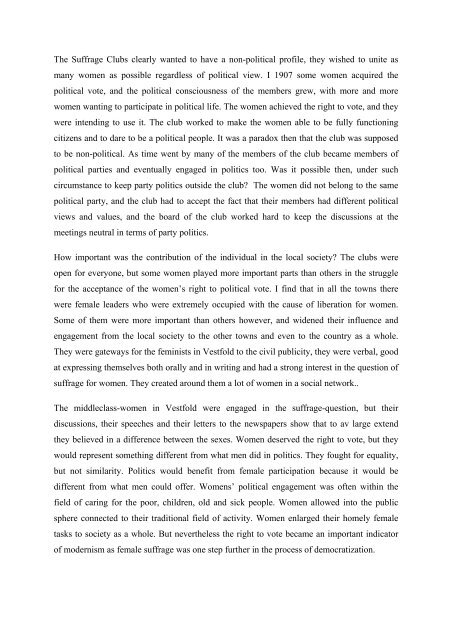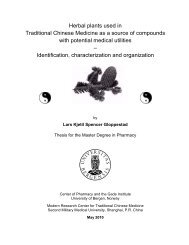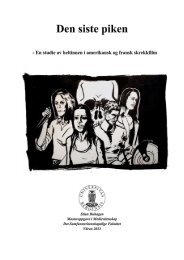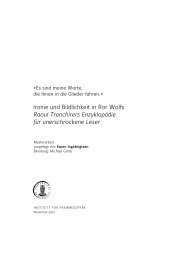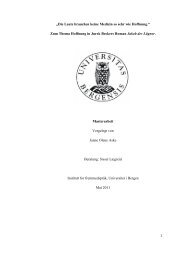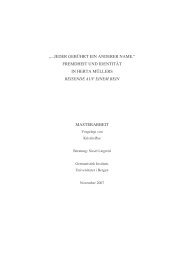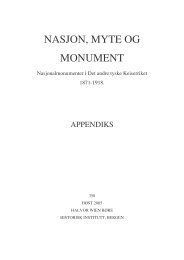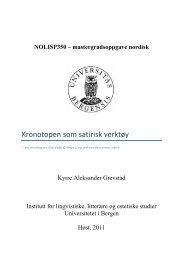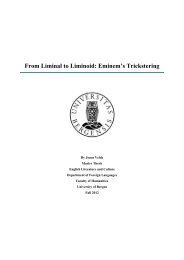- Page 1 and 2: Kvinnestemmeretten i Horten og de a
- Page 3: Forord Dette er et punktum for en p
- Page 9 and 10: Kvinnestemmeretten i Horten og de a
- Page 11 and 12: Del 1 Bakgrunnen 1.1. Innledning 1.
- Page 13 and 14: Hvilke faktorer som var viktigst i
- Page 15 and 16: 6) Irene Iversen: "Kvinnelige litte
- Page 17 and 18: Dokumentasjonsbehovet mitt har vær
- Page 19 and 20: Venstreavisene konkurrerte i sterk
- Page 21 and 22: 1. 1. 6. Diskusjonen om den kvinnel
- Page 23 and 24: tilslutning fra kvinnene som man ik
- Page 25 and 26: 1. 2. 2. Kvinnenes engasjement i En
- Page 27 and 28: stemmerettsbevegelsene var selvføl
- Page 29 and 30: kravet om stemmerett for kvinner so
- Page 31 and 32: komiteen forslagene til forandring
- Page 33 and 34: Viggo Ullmann (1848 - 1910) Skolema
- Page 35 and 36: Del 2 Horten - hovedbasen for den k
- Page 37 and 38: Venstreavisene i Horten led en hell
- Page 39 and 40: Wenche Malo Winstad hevder også at
- Page 41 and 42: Hun pekte på at utenbys medlemmer
- Page 43 and 44: ”En pluralitet paa 107 mod 51 for
- Page 45 and 46: utrettet i kvinnestemmerettsarbeide
- Page 47 and 48: udenfor vor forfatning, besluttes,
- Page 49 and 50: For Sømandsmissionen: Kristiane Ni
- Page 51 and 52: fedrelandet, var det vesentlig at k
- Page 53 and 54: lederverv innenfor ulike organisasj
- Page 55 and 56: særlig i de første årene, så va
- Page 57 and 58:
være medlem av en forening med et
- Page 59 and 60:
Horten ledd av L.K.S.F. bestod i 18
- Page 61 and 62:
Venstre i Stortinget som hadde stem
- Page 63 and 64:
Kjedsomheden nu er slut. Vi meldte
- Page 65 and 66:
"(...) Frk. Høeg Da en flerhed af
- Page 67 and 68:
dette må vi kunne si at Diskusjons
- Page 69 and 70:
aktiviteter. To av medlemmene dette
- Page 71 and 72:
utgifter, dessuten hadde de dette
- Page 73 and 74:
Marie Høeg ble spurt på årsmøte
- Page 75 and 76:
forslagene til endringer av lovene
- Page 77 and 78:
om, at Fjernhed og Passivitet ikke
- Page 79 and 80:
interessen for dette arbeidet har k
- Page 81 and 82:
Tabell 10 Aldersgjennomsnittet hos
- Page 83 and 84:
folkeopplysningsarbeidet i demokrat
- Page 85 and 86:
18)Moksnes 1984 s. 14 19)Fredrikke
- Page 87 and 88:
år som NKF ble stiftet i Norge. Et
- Page 89 and 90:
som formann i riksforeningen. Marie
- Page 91 and 92:
det var for innviklet. Hun framhold
- Page 93 and 94:
kom i gang i Horten, hun hadde vilj
- Page 95 and 96:
I mai 1899 var Marie Høeg i Tønsb
- Page 97 and 98:
Gjengangeren og Johan Beck fant ikk
- Page 99 and 100:
private sfære, men ikke helt inn i
- Page 101 and 102:
I begynnelsen av 1890-årene finner
- Page 103 and 104:
diskusjonsblad. Berge var mer frisi
- Page 105 and 106:
ha denslags Stemmeretsudvidelse? En
- Page 107 and 108:
I 1898 ble Hortens ledd av L.K.S.F.
- Page 109 and 110:
Rivaliseringen mellom lokalavisene
- Page 111 and 112:
Aksepterte virkelig den konservativ
- Page 113 and 114:
avisen brukt den kvinnelige naturs
- Page 115 and 116:
”Hvad vil de gjøre? Vil de slutt
- Page 117 and 118:
Hagerup fortsatte: ”(...) inden K
- Page 119 and 120:
avgrensende kvinnerollen. Likevel v
- Page 121 and 122:
Henspeiler disse ord på Gjenganger
- Page 123 and 124:
husholdningsarbeid. Hun burde derfo
- Page 125 and 126:
Venstreorganet, Hortens Avis, hadde
- Page 127 and 128:
7/6-1909 trykte Hortens Avis er art
- Page 129 and 130:
ville få en representant ved komme
- Page 131 and 132:
hjemmene ved kvinnenes interesse og
- Page 133 and 134:
Imidlertid følte Kristian Larsen a
- Page 135 and 136:
"Historien kan være beklagelig nok
- Page 137 and 138:
Dette er alt som stod i Gjengangere
- Page 139 and 140:
Redaktørenes personlighet, verdier
- Page 141 and 142:
Kvinnene fikk kommunal stemmerett e
- Page 143 and 144:
måtte forsere før de ble represen
- Page 145 and 146:
valgt inn i forstanderskapet for Ho
- Page 147 and 148:
Rosenqvist var gift med offiserer i
- Page 149 and 150:
I 1912 var folkemengden i Horten vo
- Page 151 and 152:
31) Dokumenter vedkommende Horten k
- Page 153 and 154:
edigering enn tidligere redaktører
- Page 155 and 156:
eformen og argumenterte ut fra nytt
- Page 157 and 158:
Ser vi på de ugifte kvinnenes yrke
- Page 159 and 160:
kvinnestemmerett. Dette begrunnet h
- Page 161 and 162:
Høyreavisen i Larvik hadde ikke v
- Page 163 and 164:
som tok det første initiativet til
- Page 165 and 166:
Overlærer N.P.M. Arctander, byens
- Page 167 and 168:
jeg vil ikke dømme hende for det."
- Page 169 and 170:
en avstemning. Det var bare en kvin
- Page 171 and 172:
sendt referater til de konkurrerend
- Page 173 and 174:
oppfordret kvinnene til å møte fo
- Page 175 and 176:
kvinnestemmeretten hvor lokale kvin
- Page 177 and 178:
Larviks ledd av L.K.S.F. viste seg
- Page 179 and 180:
3. 1. 5. Lokalpressen i Larvik og k
- Page 181 and 182:
"Vi ved da ogsaa at Kvinderne sidde
- Page 183 and 184:
En av Nesjars flaggsaker i den kort
- Page 185 and 186:
det ene året den eksisterte i byen
- Page 187 and 188:
I referatet fra Odelstinget (25/5-1
- Page 189 and 190:
"Men inden Konstitutionskomiteens r
- Page 191 and 192:
Vi finner uttrykk for avisens beten
- Page 193 and 194:
på flere områder. Det var kvinnen
- Page 195 and 196:
motstandere hadde spådd. Men dette
- Page 197 and 198:
Tiden hadde vært moden for reforme
- Page 199 and 200:
med at stemme for dette Retfærdigh
- Page 201 and 202:
Et stort bilde av Gina Krog illustr
- Page 203 and 204:
kraftig fra det Hold. En av dets Ro
- Page 205 and 206:
Innsenderen fortsatte: "Visstnok ha
- Page 207 and 208:
"Kvinder" forsøkte å få hjemmesi
- Page 209 and 210:
12) Østlandsposten 1901: Innslag o
- Page 211 and 212:
"Fra Kvindernes Leir. Isandhed har
- Page 213 and 214:
og kunnskapsrike samfunnsborgere en
- Page 215 and 216:
kanskje eneste kvinnen som ville ho
- Page 217 and 218:
leserfrieri siden Høyre- og Venstr
- Page 219 and 220:
Ingen av de borgerlige avisene i Ve
- Page 221 and 222:
merke til. Men Tokheim peker på at
- Page 223 and 224:
Tabell 16 Betalende medlemmer av Sa
- Page 225 and 226:
Innsenderen pekte på at det var da
- Page 227 and 228:
familielivet, hvorpaa samfundet er
- Page 229 and 230:
oppgavene til stemmerettsforeningen
- Page 231 and 232:
I 1892 var avisen svært opptatt av
- Page 233 and 234:
"Jeg tror, at der er kvinder, som b
- Page 235 and 236:
egyndelse sendt et cirkulære rundt
- Page 237 and 238:
"Venstre og kvinderne. I det store
- Page 239 and 240:
med stor interesse. Og da sistnævn
- Page 241 and 242:
landt de nominerede kvinder skulde
- Page 243 and 244:
en fellesliste uten kvinnenavn. Han
- Page 245 and 246:
I 1905 hadde Sandefjords Blad 13 ga
- Page 247 and 248:
"Vi hilser med glæde den af storth
- Page 249 and 250:
"Mændene fik sin stemmeret utvidet
- Page 251 and 252:
"Fru Nærups rolige, men sterke app
- Page 253 and 254:
Sandefjord og Sandeherred hadde fel
- Page 255 and 256:
"La dette bli motbevist førstkomme
- Page 257 and 258:
I samme nummer kommenterte Sandefjo
- Page 259 and 260:
Noter 1) NOS Kommunevalg i Vestfold
- Page 261 and 262:
alene hjemme med barn og med ansvar
- Page 263 and 264:
leger og skipsredere har søkt til
- Page 265 and 266:
"den største Lyst til at være med
- Page 267 and 268:
Det andre kortet er til Tora Halvor
- Page 269 and 270:
" "Fruentimmer og Børn". Da Minist
- Page 271 and 272:
en ydmyg og strykende opvarter og s
- Page 273 and 274:
forbindelsen med retten til kommuna
- Page 275 and 276:
trykt. Begge disse var sterke forsv
- Page 277 and 278:
"Det er naturligvis Kvindestemmeret
- Page 279 and 280:
Da valget nærmet seg høsten 1901,
- Page 281 and 282:
I landkommunene rundt Tønsberg ble
- Page 283 and 284:
Det er nærliggende å tro at denne
- Page 285 and 286:
Men det var nødvendig, mente Tøns
- Page 287 and 288:
Etter behandlingen i komiteen, ble
- Page 289 and 290:
"Ogsaa her, som med mændene, bør
- Page 291 and 292:
hadde satt opp på sitt program en
- Page 293 and 294:
"Kvinderne har sin store oppgave at
- Page 295 and 296:
valg kunne øve en vidtrekkende inn
- Page 297 and 298:
Mannen ville slippe å bære ansvar
- Page 299 and 300:
kvinner var valgt inn i bystyret, J
- Page 301 and 302:
konservative Tønsbergs Blad, i den
- Page 303 and 304:
Holmestrands Led ble stiftet 5. mai
- Page 305 and 306:
"De fleste af os Kvinder maa vistno
- Page 307 and 308:
Vi finner flere eksempler på at te
- Page 309 and 310:
imøtekommende overfor spørsmålet
- Page 311 and 312:
”limet” i foreningen og den som
- Page 313 and 314:
23) Folketellingen for 1900. Digita
- Page 315 and 316:
4) Årsberetningen for Sande ledd 1
- Page 317 and 318:
for mannsstemmeretten og kvinnestem
- Page 319 and 320:
Etter som kommunevalget nærmet seg
- Page 321 and 322:
stemmeberettiget Kvinde har den sam
- Page 323 and 324:
""Aftenposten" er mod kvindelig ste
- Page 325 and 326:
mente at alminnelig stemmerett var
- Page 327 and 328:
3. 4. 4. Valg og politisk engasjeme
- Page 329 and 330:
og turde å engasjere seg verbalt o
- Page 331 and 332:
Kalleberg mener at så lenge stemme
- Page 333 and 334:
sosialdemokratene stå fremmed over
- Page 335 and 336:
10) Kirsten Flatøy 1977 s. 75 11)
- Page 337 and 338:
Arbeiderpartiets Kvindeforening hol
- Page 339 and 340:
Hvordan refererte arbeideravisen i
- Page 341 and 342:
4. 5. Arbeiderkvinnene i Larvik. Ar
- Page 343 and 344:
viktig at alle arbeiderkvinner lest
- Page 345 and 346:
stadium for at naa til fuldstændig
- Page 347 and 348:
1) Hjertholm1956 s. 35 2) ibid s. 1
- Page 349 and 350:
Vestfold Arbeiderblad fant det inte
- Page 351 and 352:
for i arbeidesgiverforenigens medde
- Page 353 and 354:
Også Vestfold Arbeiderblad, som Ny
- Page 355 and 356:
"På et lite sted har en kvinnefore
- Page 357 and 358:
I 1893, 1894 og 1895 ble kvinnestem
- Page 359 and 360:
framhevet rettferdighetsprinsippet
- Page 361 and 362:
ettferdighetsprisnippet. I 1905 var
- Page 363 and 364:
avstand til borgerskapets kvinnebev
- Page 365 and 366:
Diagrammet viser at Horten har hatt
- Page 367 and 368:
Tabell 31 Kvinnedeltagelsen ved Sto
- Page 369 and 370:
Tabell 33 Kvinner i styrene for led
- Page 371 and 372:
og Gina Krog. Dorothea Christensen,
- Page 373 and 374:
Vi ser tydelig at enkelte kvinner h
- Page 375 and 376:
Tabell 37 Formennene i leddene av L
- Page 377 and 378:
menn forefektet imidlertid en nødv
- Page 379 and 380:
Noter: 1) Hellesund 2003 5. 5. Kvin
- Page 381 and 382:
5. 6. På hvilket vis påvirket Ves
- Page 383 and 384:
men ingen som markerte seg utenfor
- Page 385 and 386:
Kildeliste Litteratur: Agerholt, An
- Page 387 and 388:
Broch, Lagertha: Horten Diskusjonsf
- Page 389 and 390:
Hjertholm, Sverre: Arbeiderbevegels
- Page 391 and 392:
Melby, Kari: Kvinnelighetens stateg
- Page 393 and 394:
Stuksrud, Brit: Kvinnen, mannens me
- Page 395 and 396:
Protokoller for Diskusjonsforeninge
- Page 397:
Brev fra LKSF`s sekretær, Antonie
- Page 400 and 401:
" lærerinde folkeskolen - " lærer
- Page 402 and 403:
" mann: statsråd i Stockholm 37 "
- Page 404 and 405:
Ansatt i forretning 2 Musikkinforma
- Page 406 and 407:
Arbeidere Bradverksarbeider 2 Arsen
- Page 408 and 409:
Annet Til sammen 6 Dampskipsekspedi
- Page 410 and 411:
Tabell 17 vedlegg Medlemmer av Hort
- Page 412 and 413:
Forsørget 2 " Forretning 1 " Spise
- Page 415 and 416:
" Mann: kontorist 26 år " Mann: st
- Page 417 and 418:
arbeider/bordsorterer/høvelarbeide
- Page 419 and 420:
Kontoristinde 45 år Kontordame, sa
- Page 421 and 422:
Husgjerning (far: folkeskolelærer)
- Page 423 and 424:
ett i mot kvinnens natur. 6) Menn b
- Page 425 and 426:
arbeid. 10) Landet vil rykke opp p
- Page 427 and 428:
1912 Kvinnestemmerett berørt 8 gan
- Page 429 and 430:
1896 Kvinnestemmerett berørt 2 gan
- Page 431 and 432:
Argumenter: 1) Alle kvinner ønsker
- Page 433 and 434:
1894 - - - 1895 - - - 1896 - - - 18
- Page 435 and 436:
Tønsberg 1910 Tøns berg 1913 Holm
- Page 437 and 438:
Iversen (vara) Arbeiderpartiet x Ol
- Page 439 and 440:
1901 Sinding Høyre x Bonde Høyre


